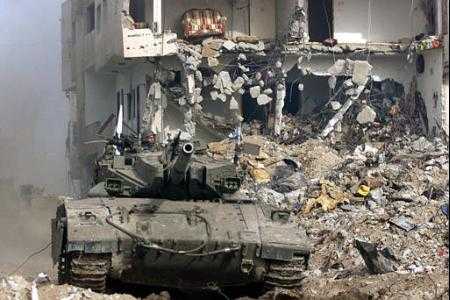Supreme Court Grants Injunction Preventing Israeli Army from Using Palestinian Civilians as Human Shields
Today, Supreme Court Justice Strassberg-Cohen granted a temporary injunction preventing the Israeli army from using Palestinian civilians as human shields and/or hostages through the army's "neighbor procedure." Adalah, on behalf of six Israeli and Palestinian human rights organizations, and on its own behalf, filed the motion for the injunction as part of an existing petition submitted by the organizations ("petitioners") in May 2002 which raised the same concerns and requested the same relief. This motion and the previous petition were filed by Adalah Staff Attorney Marwan Dalal.
Today, Supreme Court Justice Strassberg-Cohen granted a temporary injunction preventing the Israeli army from using Palestinian civilians as human shields and/or hostages through the army's "neighbor procedure." Adalah, on behalf of six Israeli and Palestinian human rights organizations, and on its own behalf, filed the motion for the injunction as part of an existing petition submitted by the organizations ("petitioners") in May 2002 which raised the same concerns and requested the same relief. This motion and the previous petition were filed by Adalah Staff Attorney Marwan Dalal.
The "neighbor procedure" is a practice in which Israeli soldiers use Palestinian civilians to perform military operations. For example, neighbors of target homes or buildings are called upon to knock on doors, check suspicious objects, and to walk in front of soldiers as the army surrounds its targets.
On 14 August 2002, Nidal Abu Mohsen, 19, was killed while being used as a human shield during the course of a military operation in Tubas, West Bank. Mr. Abu Mohsen was compelled by the army to stand in front of soldiers and knock on a neighbor's door.
In the State's response to the petition filed in May 2002 against Yitzhak Eitan, Commander of the Israeli Army in the West Bank; Shaul Mofaz, Chief of Staff of the Israeli Army; Benjamin Ben-Eliezer, Minister of Defense; and Ariel Sharon, Prime Minister of Israel, the state claimed that "the IDF [Israel Defense Forces] decided to immediately issue a decisive order … imposing an absolute ban on all of the forces in the field from using civilians … as a means to 'humanly shield' from fire or terrorist attacks by the Palestinian side or as hostages." At the same time, the military claimed that using Palestinian civilians, including the use of the "neighbor procedure," is not the same as using human beings as shields or hostages. In these cases, the army claimed that the military commanders in the field were to be afforded discretion as to whether to use civilians for military purposes.
In the current motion, the petitioners' re-emphasized their position that the "neighbor procedure" is the same as using human beings as shields or hostages. The petitioners argued that: "It is an action in which the 'assistant' is forced to perform, under the influence of the Israeli military, in order to protect the soldiers involved in the operation. All of this is done in grave violation of the civilian's rights, inter alia, to dignity and the right to be free from coercion--rights that are afforded to the community as 'protected persons' from the occupying forces according to the Geneva Convention (IV). Further, the petitioners added that the Israeli army is a well-trained force, and its position by definition, is to perform military assignments without involving civilians, unnecessarily endangering their lives, and disrespecting their rights to life and dignity.
In the motion, the petitioners addressed the state's assurances that army commanders use their discretion in utilizing the "neighbor procedure." The petitioners argued that: "In practice, the army commanders in the field praise the use of 'civilian assistants' because it protects the lives of soldiers while endangering the lives of civilians. Reliance should not be placed on the discretion of the commander in the field; from his point of view, the lives and dignity of the civilians are irrelevant. The commander's primary interest is to ensure the efficiency and success of the military operation. It is not enough to condemn this instrumental approach to civilian life and dignity; there is a duty to prevent the continuous use of these illegal actions."
The state has seven days to respond petitioners' motion. Until a final decision is made by the Supreme Court in this matter, the temporary injunction will remain in place. During this time, the Israeli army is prohibited from using Palestinian civilians as human shields for military purposes.














